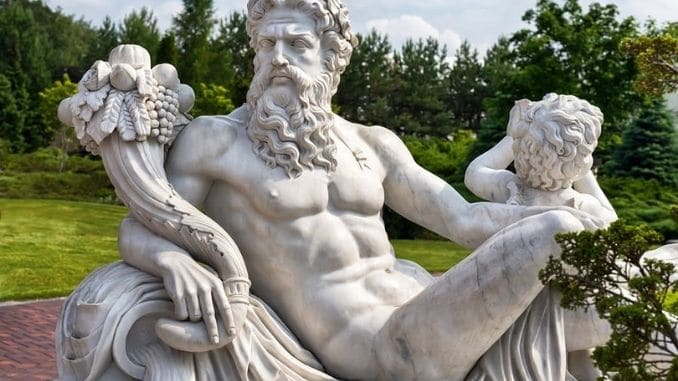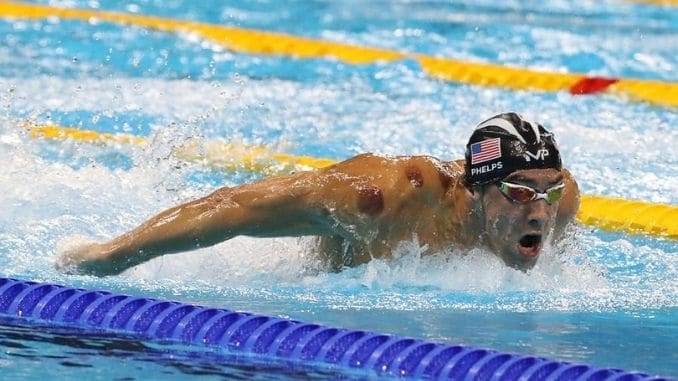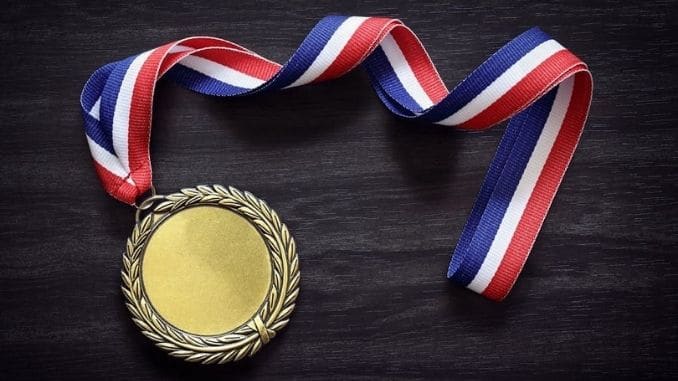
We love the Olympics. Every two years, when the Summer or Winter Olympic Games come around, ordinary mortals like us get the incredible opportunity to be entertained by the best athletes in the world. Generally, somewhere around 7 million Olympic fans will watch the games in person. Lucky dogs. As for the rest of us, the excitement of the Olympic Games will overtake our entertainment centers, flat-screen TVs, smartphones, radios and computer monitors for days on end. Many families even employ TV trays during the Olympics so that meals don’t get in the way of the spectacle.

Our overzealous enthusiasm for all things Olympics led us to do more than a little digging to find some fascinating facts about the Olympic Games throughout history. Here are some of the more captivating tidbits of torch burning trivia we found about our beloved Olympics. Hopefully, our list will provide something relevant to talk about during commercial breaks.
1. The First Official Olympic Games Is Said to Have Begun in 776 B.C. in Olympia, Greece
Although 776 B.C. is the first Olympic Games on record, there’s plenty of evidence to suggest that the Greeks had been holding regular competitive games before 776 B.C. It’s more likely that the 776 B.C. Olympic Games marked the beginning of the tradition of holding the games every four years. In 776 B.C., the participants did wear normal athletic clothing during the Olympic Games. Then, things got a little crazy for a while.
2. In 720 B.C., Olympic Participants Began Competing in the Nude
Yes, it’s true. There are several differing accounts of how the birthday suit became the official uniform of the 720 B.C. Olympic Games. However, this is the explanation that we found the most believable: Allegedly, there was an Olympic runner named Orsippos who was competing in the 720 B.C. games. Orsippos showed up to the Olympic Games wearing typical athletic clothing. Most scholars believe that athletes wore a special type of loincloth during Olympic events at that time. While Orsippos was running a race, during the games, his loincloth fell off. Orsippos, being the ever-determined competitor, kept on running without any clothing and won the race. After his big naked victory, competing entirely nude became a thing. The word gymnasium comes from the Greek word for naked, which is gymos.
3. Olympic Champions Were Crowned With Olive Wreaths
In ancient Olympic Games, the winning athletes weren’t given medals for winning. Instead, these nude sportsmen were presented and crowned with lovely olive wreaths. The wreaths were made from an olive tree that was believed to have been planted by Heracles, the god of strength, heroes and athletes. Aside from the fashionable headwear, victors were showered with gifts when they returned to their hometowns after the Olympic Games.
4. In 393 A.D., the Olympic Games Came to an End
The winds of change seemed to blow in the 4th century when the Romans conquered Greece. Christianity became the Roman Empire’s official religion. At that time, the Olympic Games, with their focus on gods, goddesses and pagan rituals became much less popular to the masses. Attendance was low. Many of the Olympic buildings, monuments and stadiums were in disrepair. Emperor Theodosius I banned pagan religious practices. Lack of interest, worn-out venues and a ban on pagan rituals made for the perfect storm that led to the end of the ancient Olympic Games. Some evidence suggests that a subset of rebels continued to hold Olympic type events. But it was no longer the widespread, mega-event it had once been.
5. In the 1620s, Richard Dover brought us the ‘Olympic Festival’
Tony Perrottet wrote an excellent book called “The Naked Olympics: The True Story of the Ancient Olympic Games.” In the book, Perrottet wrote about Dover’s Olympic Festival held in Cotswolds. According to Perrottet, “A motley range of ‘sports’ was on the schedule, including hammer throwing, bear-baiting, shin kicking and the brutally violent, ‘fighting with cudgels,’ which left the contestants bloody and toothless.” The annual event, which was eventually canceled in 1642, helped pave the way for others to rekindle the flame of the Olympic Games.
6. Pierre de Coubertin Organized the First Modern Olympic Games in 1896
French aristocrat Pierre de Coubertin was enthralled with athletics and physical education. He traveled all over the world to study physical fitness and the administration of athletic programs. His initial plan was to help develop a better physical education system for students in France. However, throughout his travels, his vision for revitalizing the Olympic Games was formed.
In 1892, de Coubertin mentioned his idea, of bringing back the Olympic Games, to the French Union of Athletic Sports Societies. A couple of years later, de Coubertin held a meeting with leaders from several other countries and an Olympic Committee was established. They decided to hold the first modern Olympic Games in Athens, Greece, on April 5, 1896, and continue with more games every four years after that. In the first modern Olympic Games, all the participants wore clothing ― with good, strong elastic bands.
7. No One Wins a Gold Medal in the Olympics Anymore
The last solid gold medal was awarded during the Olympic Games of 1912 in Stockholm, Sweden. After that, the National Olympic Committee decided to make the “gold” medals from sterling silver and plate them with 6 grams of pure gold. Though each hosting city can design the medals as they wish, the medals have to be 3 millimeters thick.
8. Tug of War was an Olympic Sport From 1900 to 1920
Yes, you read that correctly. Tug of war, the favorite game of 11-year-old summer campers everywhere, was previously an Olympic event. When it first premiered at the Paris Olympic Games, in 1900, many of the tug of war teams were made up of athletes who were competing in other events as well. Initially, teams were made up of five or six people pulling on each side. Later, up to eight people competed on each team.
1920 was the last year for tug of war, as an Olympic event. Sadly, tug of war has gone the way of a few other Olympic sports, like dueling pistol, croquet and motor boating. Big fans of the sport have been hopeful to see it return. The Tug of War Association (TOWA) has been petitioning for a reintroduction of the event for years. They had high hopes when Olympic organizers were considering tug of war as an added event for the Tokyo Games in 2020. However, it was eventually bumped in favor of other new additions like surfing, karate and skateboarding.
9. The Motto of the Olympic Games Is ‘Citius, Altius, Fortius’
The motto is Latin and means, “Faster, Higher, Stronger.” de Coubertin designated the motto in 1894 when the International Olympic Committee was established. de Coubertin gave credit for creating the motto to his friend, Henri Didon, a priest who was also very interested in sports. The motto wasn’t commonly linked with the Olympics until the 1924 Paris Olympic Games when it was officially announced.
10. In 1924, the Winter Olympic Games Were Added to the Mix
On January 25, 1924, in Chamonix, France, the first Winter Olympic Games began. Sports like figure skating, ski jumping, ice hockey and bobsleigh took center stage. The Winter Olympics was first called “International Winter Sports Week.” These games occurred in the same year as the Summer Olympic Games. It wasn’t until the 1990s that the International Olympic Committee decided the Winter Olympic Games would occur two years after the Summer Olympic Games and continue every four years after that. Winter Games would begin again in 1994 and Summer Games would be in 1996. This designation, of course, was music to the ears of Olympic aficionados everywhere who would ― never again ― have to wait four long years between Olympic Games.
11. Some Olympic Games Are Very Special
In the 1950s, Eunice Kennedy Shriver, sister to President John F. Kennedy, was saddened by the way that young people with intellectual disabilities were treated. She saw that many such children weren’t included in team sports and weren’t encouraged to play.
Determined to make a difference for these special children, Shriver decided to hold a summer day camp for intellectually disabled youth in her backyard. The camp was opened in June 1962. According to the Special Olympics website, Shriver’s goal was to learn what these children could do in sports and other activities ― and not dwell on what they could not do.
The camps for special children were a huge success and a door of opportunity for young people with intellectual disabilities. In March 1968, Shriver and the Chicago Park District announced plans for the first “Olympic” games for intellectually disabled youth. In July of that year, the first International Special Olympics Summer Games were held in Chicago’s Soldier Field. Around 1,000 athletes from the United States and Canada competed that day. With the event’s success, Shriver declared the Special Olympic Games would continue and be held every two years. Today, the Special Olympics is endorsed and recognized by the International Olympic Committee and remains one of the only organizations that has been granted permission to use the Olympic name.
Throughout history, the Olympic Games Have Provided People Around the World With a Common Ground
When the Olympics take place, people from Beijing, China to Little Rock, Arkansas, are watching the same incredible athletes participate in the games. The Special Olympics helps create a level playing ground for all kinds of athletes. Through the years, the Olympic Games have offered an inspiring and unifying worldwide event for everyone to enjoy.
So, the next time you’re gathered around the television with a few other Olympic junkies, feel free to share these riveting facts about sprinting naked athletes, sterling silver “gold” medals and the short-lived shin kicking event. You’re well-informed to be the master of Olympic trivia during the coming Olympic Games.
If you want to trim down your body, get younger, increase your metabolism and energy and heal your pain, then check out the Best Foods That Rapidly Slim & Heal in 7 Days program, here!





